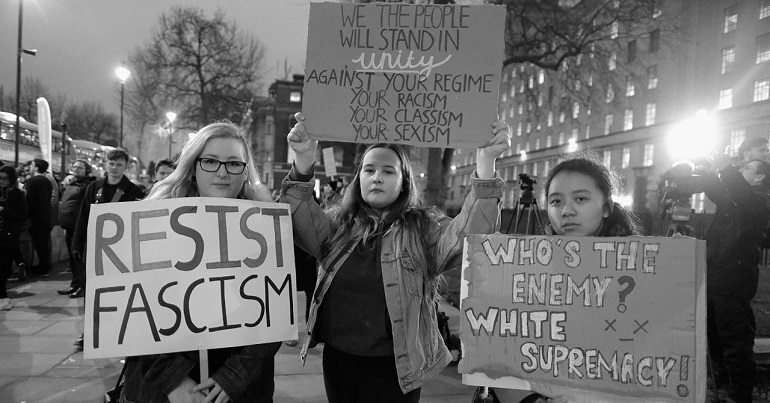Greens must be at the forefront of resistance to the far right

The far-right is on the rise across the world. From Germany – where the AfD host neo-Nazi views and holocaust apologia, to Italy – where the Northern League have been pushing violent anti-migrant policies, to the US, where the Trump regime has turned an already violent immigration system, into a system of widespread racial terrorism.
For the far-right, coronavirus is an opportunity to profit from the insecurity which comes from crisis. This can be seen in Hungary, which on April 3 formally ended democracy. Coronavirus will only be the first of many crises, as climate catastrophe fully takes root and we are buffeted from one crisis to another.
After coronavirus, the next crisis may be a drought, or a crop failure, or a flood, or a hurricane, but crisis will become closer to the new normal, and the far right will seek to exploit this. In the UK, the Conservative Party has already introduced a migration law which will lead to an intensification of the hostile environment, targeting poorer migrants, and has incorporated many far-right ideas within its Brexit project. With the Labour Party adopting a new centrist political direction, the Green Party needs to be at the forefront of the electoral fight against the far-right. Our new leadership team needs to have the skills and the politics to face this challenge.
As a first stage, we need to be clear about which side we are on. As Young Greens co-chairs Tom Hazell and Rosie Rawle argue, this means embracing class politics. Our leadership needs to consistently back tenants over landlords, workers over bosses, ordinary people over companies. We need to be at the forefront of campaigning for migrants’ rights, and trans rights and the rights of all those who will be most affected by our new far-right world. We need to pair this with calls for meaningful climate action and a Green New Deal.
This might mean the new leadership team drawing attention to different areas of the Green Party’s policy platform, for example our policies rapidly to reduce the use of prisons, which are disproportionately used against ethnic minorities. Fighting the growth of the far-right requires embedding our electoral politics within grassroots movements, within tenant and workplace unions, within anti-racist groups and within grassroots climate activist movements, such as UKCSN.
We need to be the electoral wing of these grassroots movements, as powerful voices supporting, participating in and championing their work rather viewing ourselves as separate from it. The new leadership team should avoid language which speaks to an implicitly white middle class audience, for example framing political battles surrounding migrants’ rights as ‘us’ wanting to help ‘them’. In order to successfully combat the far-right the Green Party must base its appeal on solidarity, a common social and economic struggle, rather than technocracy, the belief in enlightened policymakers delivering climate reforms from above.
Technocratic Green politics, with its focus on individual reforms which can be melded to any broader political program, is vulnerable to cooption by the political right. The example of the Austrian Green Party, which has entered into government with a far-right party based on a political programme of Carbon Taxes, Green Infrastructure investment, a Burqa ban and migrant deportation offers a cautionary tale for the Green Party as to where more technocratic Green politics can lead. Our new leadership team must be careful to frame our program as a holistic plan for transforming our society, rather than individual ‘good ideas’ which don’t come from any political perspective.
To avoid this requires a change in our leadership structures. Jonathan Bartley’s comments on Halal meat were more than just an embarrassing mistake. They were reflective of a leadership that is currently largely middle class and white, and that could benefit from different voices in the room. GPEx (the Green Party’s executive, which will be elected with the leadership) currently contains only one non-white member – the Equality and Diversity coordinator. Partly due to the scarcity of professional roles within the party, large swathes of the senior volunteer base are middle class, as only those with a level of economic security can afford to give the amount of volunteer time which this requires. The new leadership team (inclusive of GPEx) needs to be more representative of our communities, and better prepared to work with liberation groups to enhance their knowledge in areas where they lack experiential understanding.
Our new leadership needs to lead this transformation of the Green Party to become the main party struggle against the far-right. The world of the future may seem dark and unfriendly. However, the only politics which will effectively tackle the threat of the far-right in the grip of crises of capitalism and climate, will be politics that will radically improve our world and our country for everyone. A better world is possible and the fight for it has never been more urgent.
This article is the third in a series on the forthcoming Green Party of England and Wales leadership election. Bright Green has invited a number of Green Party members and activists to contribute their views on what the next Green Party leader should deliver. The articles in this series can be found here.
PS. Bright Green has big plans for the future, but we need your input. Take 2 minutes to see what we’re planning and tell us your thoughts.
Image credit: Alisdare Hickson – Creative Commons



The far right are on the rise across the world. Examples given of germany hungary italy and usa. Countries which have own green party’s.
Believes far right will be on rise in uk post covid19. Err no.
Privileged white man doing a phd says not to sound like privileged white man.
Rolls eyes. White man, white-splaining.
Turns over.